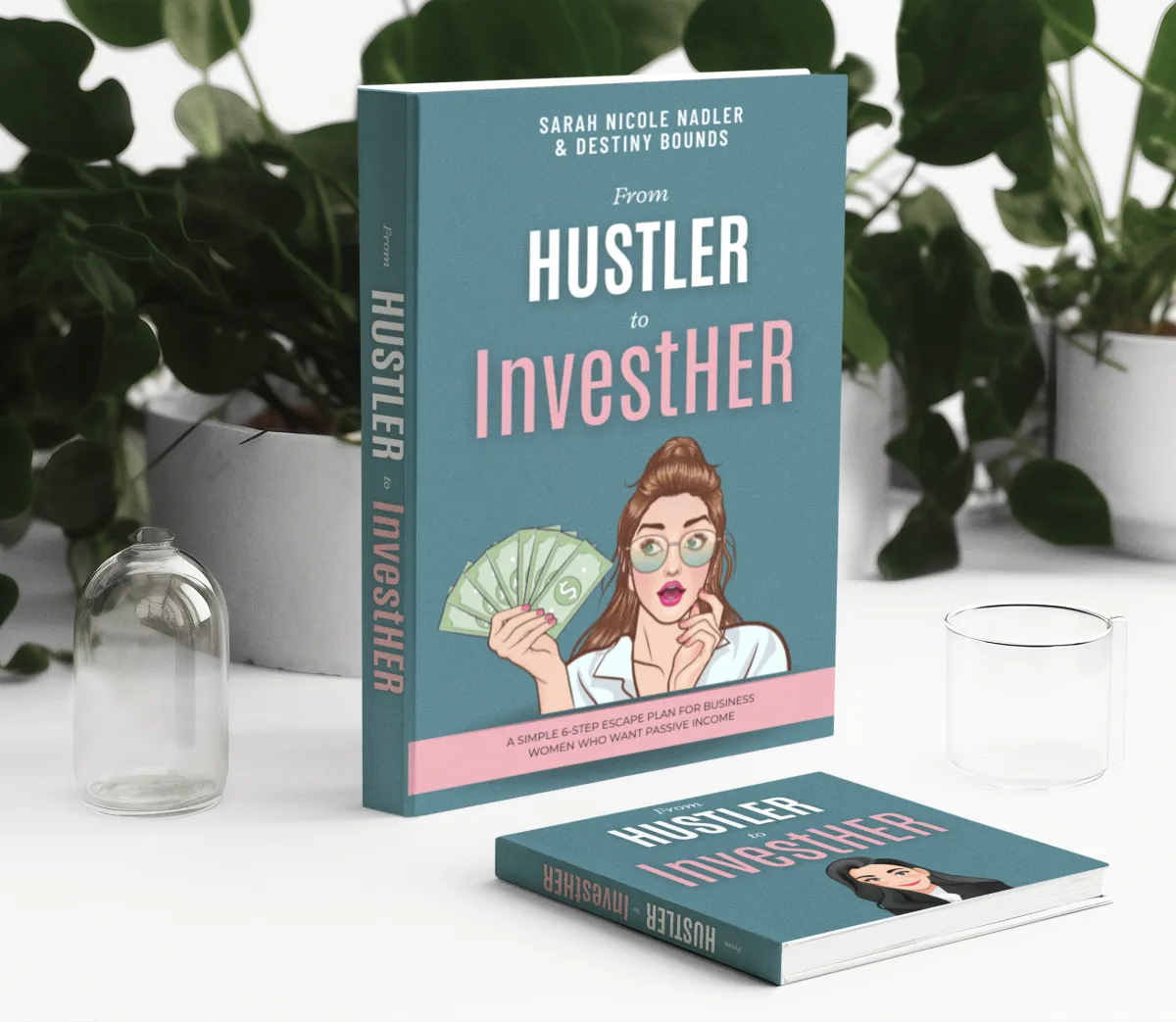
How To Create Healthy Spending Habits
“If you aren't earning enough to support yourself yet, it's easy to think that's because you need a budget, or are 'bad with money'.”
Do you feel like you’re “bad with money” or have unhealthy spending habits?
This is a common complaint I hear from female entrepreneurs, regardless of their income level. If you aren’t earning enough to support yourself yet, it’s easy to think that's because you need a budget, or are “bad with money”.
But even once a business woman is full-time in her business, that feeling doesn’t just go away. You can think of it as coming from two places:
Unhealed money trauma; past incidents, generational poverty, etc
Improper education around money and finance, or no education on the subject at all!

I used to have a real spending problem; I spent every dollar I made (and sometimes more) and that problem only got worse when I started making 10x more than I had before.
Today I’m living my dream lifestyle on a 16-acre farm, with an investment portfolio that pays me passive income every month and on track to retire before my 45th birthday.

Sarah & Ben Nadler on The Pemberley Farm
So this week, on Fierce Feminine Finance, let me show you how I created healthy spending habits, so you can stop feeling like there’s something wrong with you, and start achieving your financial goals.
Where Unhealthy Spending Comes From
When my second business took off, I found myself suddenly earning 10x more than I ever had before!
It was a heady feeling… but also a dangerous one.
I went from always having to be cautious of my spending… to suddenly having more than I could easily spend in a day of fun.
And unfortunately, lifelong spending habits began to shine through very starkly.
See, when every penny had to be accounted for, I didn’t really have the opportunity to go on wild spending sprees.
So the desire for “stuff” would just wind up inside me… and any time I got an unexpected windfall (tax return, cash gift, high ticket sale) I would go out and spend every dollar of it.
That wasn’t terrible, because I never spent more than I had, but it wasn’t great either. I had zero savings, investments or retirement plans. And even though I loved my business… the honest truth is I would have worked until I died if I hadn’t changed my habits around spending.
When you have had very little for a very long time, it's natural to feel starved for OWNERSHIP.
The deprivation makes you want to spend every red cent when you finally do manage to acquire money.
This very fact is often why nearly one-third of lottery winners eventually go bankrupt within three to five years. With no way to heal their past money trauma, and suddenly overwhelmed with money they didn’t earn, it’s easy to overspend.
Additionally, as business women we tend to self-sabotage by only earning as much money as we feel we urgently “need” (and sometimes not even that!).
The solution to both of these problems:
Long bouts of deprivation followed by obsessive spending, and
Failing to earn enough for investments, savings, etc., because it doesn’t feel like an “urgent need”
…is changing the way you budget.

The Right Way To Design A Budget
Most women budget by writing down a list of expenses, which then sits in a dusty drawer somewhere out of sight, or on a spreadsheet which also sits out of sight on your desktop most of the time!
In other words, the problem with most budgets is that they aren’t right in front of your face while you’re spending money.

The old envelope system attempted to solve this by stuffing envelopes with cash and labeling each with a category of your budget:
You had the “rent” envelope, the “groceries” envelope, etc.

While that was effective and useful up until the 90s…these days we rarely use cash to pay bills, and since 2020 some retail stores won’t even accept it!
So how do we create that same useful system of visible budgeting… but in the digital space?
The Financial Grip System of Budgeting is how Ben and I do it. By having a separate savings account for each major category of our budget, we create “sinking funds” that physically remove the money from our main checking account and create an easy, free and visual way to view our budget… right in the banking app!
That solves one problem (shopping without your budget in front of you) but what about the issue of overspending instead of saving, investing and taking care of future you?

Ben and I quickly realized that by creating sinking funds for these, and treating them like categories of our budget–just as vital as the mortgage bill–we could “trick” ourselves into earning more per week in our business because we “had to” in order to make ends meet!
Anything you can do to raise your sense of urgency to earn more… all while spending less frivolously, will help you gain control of your money in the long run.
Set Healthy Boundaries Around Fun Money
As I mentioned earlier, there is a painful trend that can happen when you go too long without having a budget: when you sit in deprivation for too long, it can spark wild spending sprees once you come into some cash.
To avoid this, you have to make sure your budget includes a “Fun Money” category.
Prioritize your fun based on what you value most within that budget, and emphasize saying “yes” to yourself often and without guilt.
A great way to do this is to practice saying “no thanks” to opportunities and circumstances that would take you outside your Fun Money budget (overspending).
By practice, I mean to a mirror, a partner or a friend. Just go ahead and try it now: lock yourself in the bathroom and tell yourself in the mirror, “No thanks, I prefer to spend my Fun Money on ______.”
This is also a great test of genuine friendship! Those who truly love you will respect your new boundary, and be disappointed but proud of you for learning this new skill of budgeting.
Those who secretly despise you, hate you, or are too selfish to care about you over themselves, will likely mock your “foolish” attempts to improve.
Keep a close eye on those who speak negatively about you to your face… or behind your back. They are the most expensive “habit” you have; because knowing them might cost you more than just your money. They can cost you your self-respect.
How To Use Affirmations To Rewire Your Thinking
“When we talk about mental wellness, we are not just focusing on our mental or cognitive functioning, but also our emotions; our social relationships; our ability to function in daily life; and even our spiritual, religious, or existential state.”
When most people talk about building healthy spending habits, they tend to focus on saying “no” to themselves and avoiding activities they enjoy (avocado toast, Starbucks, going to the bar, etc) in a sort of “I’ll suffer now so I can enjoy life later” attitude.
But what if you simply earned enough in your business to have BOTH?
I know, I know… that’s harder to do than it is to say.
But hear me out!
Oftentimes we get this long-suffering mindset about money because we are convinced that hitting a bigger goal (like living your dream lifestyle before age 65) is “impossible”.
But what if I told you that the very fact that you think it is impossible is 99% of the reason you haven’t accomplished it yet?
There seem to be two major schools of thought in the business world on the topic of belief.
One set says that focusing on belief is “fluffy” or nonsense, and that DOING is the most important fact in the success of an entrepreneur.
The other half of our world will tell you miraculous stories about folks who have manifested amazing opportunities through things like prayer, meditation, or the power of decision alone.

Each group has converts from the other side...examples and stories to tell; theories and ideas to support each side of this sticky pendulum.
Take Dr. Bruce Moseley, an orthopedic surgeon who, skeptical of all the talk on “mind over matter”, was forced to admit the validity of some part of it after he noticed a placebo group responded as well to being told they had been operated on as his actual patients did!
So lest you lose sight of the goal and go off into la-la land, creating fluffy daydreams that never materialize, let’s at least agree that not all minds are equal.
For some, reshaping their vision of the world and putting order and control into their thoughts is easier than for others.
This is probably the secret behind the two schools of thought. Those who are more spiritually aware, who have experienced less mental trauma, and who are naturally endowed with a lot of creative energy, find it easy to shift negative self-talk and shape the world around them by thought alone.
But for us mere mortals, building a business requires work.
I waste little time wishing, hoping or wanting things to happen. I decide where I want my business to go, and then get busy making it happen.
This is because I am self-aware enough to recognize that pure manifestation of my dreams is not a skill I possess at this time. I base my actions upon correct expectations of my own mental powers.
Sometimes I am aided by apparently miraculous circumstances, or experience moments of spirituality when I find myself at the exact right place at the right time.
I’ve had money fall into my lap when I needed it, and have had the feeling of being a vessel of this powerful force that shapes the universe.

Like the time when I put a copy of my book on marriage in my bag at the last minute before embarking on a business trip...only to encounter a woman whose husband was threatening divorce. I gave her that copy for free along with my cell number.
But like the practical woman I am, I know the foolishness of relying on luck or God to run my business for me.
For my Christian readers, I will add this piece of wisdom, “Ask and it will be given to you; seek and you will find; knock and the door will be opened to you.” - Matthew 7:7-8
But please note that even Matthew had to do a little seeking and knock on the right door first!
On a scientific note, Dr. Jerome Groopman mentioned in his book The Anatomy of Hope:
“Researchers are learning that a change in mindset has the power to alter neurochemistry. Belief and expectation - the key elements of hope - can block pain by releasing the brain’s endorphins and enkephalins, mimicking the effect of morphine.”
By thinking positively, you can not only alter your neurochemistry but form new beliefs that influence your attitude, and therefore the outcome of all your financial endeavors.
For a practical example of this, try this exercise:
Start a 30 day journal to document the limiting beliefs and negative attitudes you currently have about money and investing. What stories are you telling yourself that trigger fear or other negative emotions at the thought of chasing after your dreams?
Once you have identified a few of them, begin exercising self-discipline to change those beliefs to a higher-vibe belief or thought.
Keep a note on your phone or a small notepad and pen in your pocket throughout the day.
Every time you start to worry or experience negative emotions or thoughts about your goals and dreams, pause and make a note of it.
When you see an opportunity, do you get excited? Or does your mind tell you, “You’re not good enough. You’ll never be able to accomplish that!” Etc?
Each time you think a negative thought about your goal, make a conscious effort to reframe that thought with a positive one.
Focusing on that specific thought, flip the script and put your intention behind thinking positively about it. This can be verbal or nonverbal.
Examples:
If my limiting belief is: “I can’t do this” I reframe it as: “I am infinitely capable of accomplishing my goals. Not only can I do it… I AM doing it every. single. day.”
If my negative thought is: “I’ll never hit $1M dollars” I pause, and consciously reframe that thought as: “By the end of next year, I will be a $1M business owner”.
Using A Holistic Approach To Mental Wellness To Resolve Stress Without Overspending
Occasionally, I have met women who overspend because of stress. "Retail therapy" might sound funny in the movies, but the dopamine hit many of us get while shopping can cause more problems than it solves!
When stress is the primary reason you overspend, it becomes vital to understand your own mind better... so you can master the skill of relieving your stress without avoidance and unhealthy habits.
I am not a doctor, and have no intention of providing anyone with medical advice.
Instead, I would like to share with you resources I have discovered, purely in the form of education and critical thinking, to help you make an informed decision about how to overcome stress and prevent overspending.
Some will tell you that the solution to every stressful emotion is to pop a pill in your mouth.
Yet in 2013, the Canadian Psychological Association published a study called, The Efficacy and Effectiveness of Psychological Treatments, where they announced: “These therapies work as well as or better than drugs for depression, anxiety, obsessive-compulsive disorder, and post-traumatic stress disorder;”.
They went on to describe activities such as listening to music, talking to a friend, taking a walk in nature, taking a vacation, getting a massage, taking a bubble bath, squeezing a stress ball, or just carving out some time for peace and quiet in daily life.

This fit into the context of what I had always understood but found so difficult to put into words.
As someone who has experienced and been witness to trauma both physical and emotional, the “mental health” system always seemed to me an irreducible minimum of help for a person.
To wait until a human being is so beaten down by life, or so damaged emotionally and spiritually that they begin to act irrational...and to then label them “mentally ill” in one form or another and use symptom-management (psychotropic medication) as the only form of treatment seemed to me a form of laziness that crossed easily into abject cruelty.
I was always struck by the illogic of this broken system of “mental health”. Despite the trauma in my own past, I refused all medical treatment and set out on a journey of self-discovery to find non-drug answers.
Now, perhaps you are right at this moment taking a psychotropic medication prescribed by your doctor, and find it is helpful to you. This is no judgment on you for doing so! And as you will soon see, it is easy to understand why such drugs can provide a sense of relief.
There are 4 basic types of treatment any professional can offer when discussing your health:
• Preventive: Wellness practices that help avoid health issues.
• Restorative: Approaches that reinstate wellness by addressing root
causes.
• Symptom Relief: Methods to minimize health symptoms.
• Over-Care Avoidance: Ways to avoid unnecessary and potentially
harmful treatment.
Medications such as antidepressants are meant to treat the symptoms of mental unwellness, not “cure” them.
They do not restore a person to mental wellness. They fall under the category of Symptom Relief.
If you are depressed because you’ve just been through your 2nd or 3rd divorce, an antidepressant isn’t going to improve your relationship skills or help you find the reason for your past failures!
I would also like to point out that in every other medical profession, symptom relief is considered appropriate for triage and for hospice...but any family doctor worth his salt knows the folly of only treating symptoms with a cocktail of drugs when you COULD be restoring actual health.
So in a profession like entrepreneurship, where the risks are high, the quality of life tends to suffer, and ambition can sometimes out-stretch common sense, I think it behooves us to talk about Preventative and Restorative Mental Wellness.
Not just a temporary relief of symptoms... or allowing Big Pharma to make us all lifelong drug addicts, but finding the root cause and eradicating it!
If you see that your unhealthy spending habits are creating problems in other areas of your life, rather than allowing some drug pusher to get a kickback by prescribing you a pill, take a look at the list above and ask yourself these questions:
What am I doing on a daily basis to prevent the circumstances that lead to me overspending?
Where can I invest in approaches that will locate and eradicate the root cause of my unhealthy spending habit? (money trauma, false beliefs, ignorance, etc)
Is temporary symptom relief of my stress about money necessary? Instead of a pill, can I get the same results by listening to music, talking to a friend, taking a walk in nature, taking a vacation, getting a massage, taking a bubble bath, squeezing a stress ball, or just carving out some time for peace and quiet in daily life.
If immediate relief of my stress IS necessary, how will I avoid an unhealthy over-usage that becomes avoidance of the real problem?
I hope these questions allow you to take an objective look at your approach to the everyday problems of building healthy spending habits and improve your mindset around money.
A Beginner-Friendly Class On Investing & Building Passive Income for Business Women and Entrepreneurs
Get my exclusive strategy for turning your intellectual property into passive income and growing it to 5-figures per month and beyond! FREE


© Copyright 2024 Sarah Nicole Nadler LLC. All rights reserved.
2022 All Rights Reserved.


